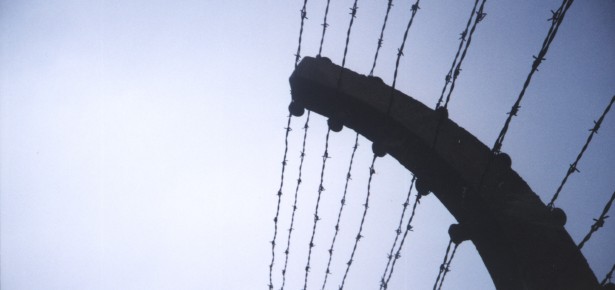
The much-discussed Polish law of January 26, 2018 criminalizes accusations that “the Polish people or the Polish state” had been complicit in Nazi crimes or had committed any other “crimes against peace, [crimes against] humanity or war crimes.” Polish officials claim that the law’s only purpose is to “eliminate from the public discourse” phrases such as “Polish death camps.” And indeed, those camps were by no means Polish, although one may doubt whether calling them Polish (which can simply mean “located in Poland”) actually warrants a three-year prison sentence. In any event, the wording of the enactment leaves no question as to the lawmakers’ real intentions: the statute makes it illegal to claim that ethnic Poles were in any way involved in the Holocaust. According to Polish prime minister Mateusz Morawiecki, such claims are a form of Holocaust denial. But it is more accurate to say that the Polish law itself is a manifestation of Holocaust negationism.
Holocaust denial does indeed take different forms. Some deniers argue that there were no gas chambers, others call the Shoah “a detail in the history of WWII,” and still others suggest that the number of the Jewish victims has been grossly exaggerated. During the Soviet period, victims of the Nazi atrocities were identified as Soviet (Polish, and so on) citizens, civilians, or even anti-fascists rather than as Jews, which was also a way to deny the Holocaust. This tradition is still alive in Eastern Europe, where most nations present themselves as victims of Nazism or communism, and draw a veil over their own participation in the atrocities of both totalitarian regimes as well as in other crimes against humanity. Poland, which has every right to pride itself on its struggle against Nazi Germany, is no exception to this rule.
Memory laws that criminalize certain statements about the past currently exist in some thirty European countries. I have recently published (with Cambridge University Press) a book about them in which I argue that memory laws have become an important European phenomenon and a preferred instrument of the manipulative politics of the past and of memory wars within and between many European countries. Their evolution is characteristic of the changing political and cultural climate, which since the beginning of this century has been increasingly marked by the rise of national populism.
There exist several types of memory laws. The first such statutes, adopted in the 1980s and 1990s in the old continental democracies such as Germany, France, Austria, Switzerland, and Belgium, banned Holocaust denial and/or the denial of other genocides and crimes against humanity. They were important evidence of a new democratic culture of memory based on sympathy for the victims of state-sponsored atrocities and on notions of shared responsibility and of state repentance for the crimes of the past. The European Union gave its full support to this legislation, with the combined goal of overcoming self-congratulatory national narratives, creating a common European memory, and diminishing the danger of new armed conflicts.
Yet in Eastern Europe, the Holocaust-centered politics of memory presents a challenge, because local populations did participate in the extermination of the Jews, because the legacy of communism is far more important for the region than that of the German occupation, and finally because national narratives have a stronger appeal in countries that acquired their independence only a few decades ago, after the collapse of the Soviet Empire. The memory of the Holocaust is often viewed by Eastern Europeans as a symptom of the hegemonic imposition of Western values and of the West’s indifference toward their memories and concerns.
Some Eastern European memory laws are modeled after their Western prototypes. But several countries have passed enactments of a very different type, which ban the denial of both Nazi and communist crimes. Poland was the first to do so back in 1998; the Czech Republic, Hungary, Lithuania, and Latvia followed suit. There are no such enactments in Western Europe, because considering Nazism and communism two equally criminal regimes is hardly compatible with the Western tradition of social democracy and with the narrative of a “good war” in which Stalin and the West were allies.
The problem with these statutes is not that they ban the denial of communist crimes, which is understandable in light of those countries’ historical experience. The problem is that while doing so, they shift the blame for past atrocities entirely to others and victimize the past on behalf of the respective nation-states, which is the opposite of what the European Union is trying to achieve by promoting the notion of state repentance for those past atrocities.
There also exists a sub-type of memory statute that gives the force of law to national narratives: in 2005, Turkey passed an act that outlaws insults to the Turkish state (which in practice means a ban on calling the mass killing of Armenians in the Ottoman Empire a genocide), while Russia prohibited the “dissemination of knowingly false information on the activities of the USSR during the Second World War” in 2014. These laws not only effectively cover up but also prohibit the recognition of crimes committed by the Turkish and the Russian states respectively. The new Polish law also belongs to this sub-type, although it makes it illegal to accuse the Polish people of crimes committed by individual Poles whereas the Turkish and Russian statutes criminalize insults to the memory of oppressive regimes.
My main point about memory laws is that this instrument, forged to promote democracy, is now being used increasingly often by national populists seeking to promote an aggressive politics of memory. When a democracy limits democratic freedoms, it creates a precedent that legitimizes repressive practices in less democratic, more authoritarian countries.
Latest Comments
Have your say!